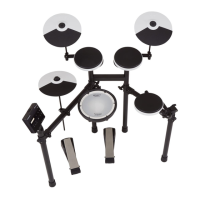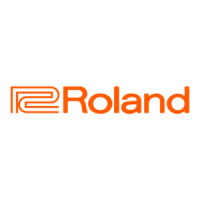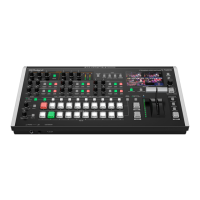47
Multi-Eect Parameters
AUTO WAH
Cyclically controls a lter to create cyclic change in timbre.
Parameter Value Explanation
Filter Type
LPF, BPF
Type of lter
LPF: The wah eect will be applied over a
wide frequency range.
BPF: The wah eect will be applied over a
narrow frequency range.
Manual
0–127
Adjusts the center frequency at which the
eect is applied.
Peak
0–127
Width of the frequency region at which the
wah eect is applied Increasing this value
will make the frequency region narrower.
Sens
0–127
Adjusts the sensitivity with which the lter is
controlled.
Polarity
UP, DOWN
Direction in which the lter will move
UP: Move toward a higher frequency
DOWN: Move toward a lower frequency
Tempo Sync
OFF, ON
Species whether the modulation rate is
specied as a note value (ON) or not (OFF).
Rate
0.05–10.00Hz,
note
Frequency of modulation
Depth
0–127 Depth of modulation
Phase
0–180deg
Adjusts the degree of phase shift of the left
and right sounds when the wah eect is
applied.
Low Gain
-15–+15dB Gain of the low range
High Gain
-15–+15dB Gain of the high range
Level
0–127 Output Level
OD/DS
0
TWAH
Parameter Value Explanation
Drive Switch
OFF, ON Turns overdrive/distortion on/o
Drive Type
OVERDRIVE,
DISTORTION
Type of distortion
Drive
0–127
Degree of distortion
Also changes the volume.
Tone
0–127 Sound quality of the Overdrive eect
Amp Switch
OFF, ON Turns the Amp Simulator on/o.
Amp Type
SMALL, BUILT-IN,
2-STACK, 3-STACK
Type of guitar amp
SMALL: small amp
BUILT-IN: single-unit type amp
2-STACK: large double stack amp
3-STACK: large triple stack amp
Touch Wah
Switch
OFF, ON Wah on/o
Touch Wah
Mode
LPF, BPF
Type of lter
LPF: Produces a wah eect in a broad
frequency range.
BPF: Produces a wah eect in a narrow
frequency range.
Touch Wah
Polarity
DOWN, UP
Direction in which the lter will move
UP: Move toward a higher frequency
DOWN: Move toward a lower frequency
Touch Wah
Sens
0–127 Sensitivity with which the lter is modied
Touch Wah
Manual
0–127
Center frequency at which the wah eect is
applied
Touch Wah
Peak
0–127
Width of the frequency region at which the
wah eect is applied Increasing this value
will make the frequency region narrower.
Touch Wah
Balance
D100:0W–
D0:100W
Volume balance of the sound that passes
through the wah (W) and the unprocessed
sound (D)
Low Gain
-15–+15dB Gain of the low range
High Gain
-15–+15dB Gain of the high range
Level
0–127 Output Level
LOFI COMPRESS
This is an eect that intentionally degrades the tone character for
creative purposes.
Parameter Value Explanation
Pre Filter Type
1–6
Selects the type of lter applied to the sound
before it passes through the Lo-Fi eect.
1: Compressor o
2–6: Compressor on
LoFi Type
1–9
Degrades the tone character. The tone
character grows poorer as this value is
increased.
Post Filter
Type
OFF, LPF, HPF
Selects the type of lter applied to the sound
after it passes through the Lo-Fi eect.
OFF: no lter is used
LPF: cuts the frequency range above the
Cuto
HPF: cuts the frequency range below the
Cuto
Post Filter
Cuto
200–8000Hz Basic frequency of the Post Filter
Low Gain
-15–+15dB Gain of the low range
High Gain
-15–+15dB Gain of the high range
Level
0–127 Output Level
DISTORTION
Produces a more intense distortion than Overdrive.
Parameter Value Explanation
Drive
0–127
Degree of distortion
Also changes the volume.
Tone
0–127 Sound quality of the Overdrive eect
Amp Sw
OFF, ON Turns the Amp Simulator on/o.
Amp Type
SMALL, BUILT-IN,
2-STACK, 3-STACK
Type of guitar amp
SMALL: small amp
BUILT-IN: single-unit type amp
2-STACK: large double stack amp
3-STACK: large triple stack amp
Low Gain
-15–+15dB Gain of the low range
High Gain
-15–+15dB Gain of the high range
Pan
L64–R63 Stereo location of the output sound
Level
0–127 Output Level
OVERDRIVE
This is an overdrive that provides heavy distortion. The parameters
are the same as for “DISTORTION.”
SATURATOR
A saturator which distorts the sound is connected in parallel with a
compressor, producing a rougher tonal character and boosting the
loudness. This also cuts the low-frequency region of the input audio.
Parameter Value Explanation
Saturator Gain
0–127 Input volume to the saturator
Saturator
Drive
0–127 Degree of distortion
Saturator
Level
0–127 Output volume of the saturator
Comp Depth
0–127 Amount of compression

